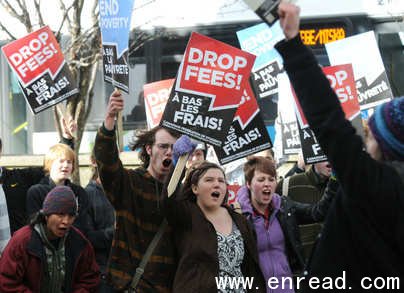24日英国多个城市爆发了第二波学生游行示威活动,抗议政府削减教育经费、增收大学学费。

Tens of thousands of students and school pupils walked out of class, marched, and occupied buildings around UK in the second day of mass action within a fortnight to protest at education cuts and higher tuition fees.Tens of thousands of students and school pupils walked out of class, marched, and occupied buildings around UK in the second day of mass action within a fortnight to protest at education cuts and higher tuition fees.
Amid more than a dozen protests, estimated by some to involve up to 130,000 students, the only significant violence came in central London. Late in the evening a crowd rampaged(暴怒,狂乱) near Trafalgar Square, smashing windows on buses, shops and offices, including the Treasury1.
Earlier a small group of young protesters, many of school age, tried to break through police lines. Others seized on an unattended police van, smashing windows and scrawling2(乱涂,涂鸦) graffiti(涂鸦) along its side.
The coalition3 government condemned4 the protests, saying they were being hijacked5 by extremist groups. The education secretary, Michael Gove, gave a notably6 combative7 response, urging the media not to give the violent minority "the oxygen of publicity8", a resonant9(洪亮的,共振的) phrase associated closely with Margaret Thatcher's efforts in the 1980s to deny the IRA television coverage10.
Gove said the government would not waver, adding: "I respond to arguments, I do not respond to violence."
In contrast Nick Clegg, the deputy prime minister, whose pre-election pledge to oppose increased tuition fees has made him the focus of student anger, spoke11 of his "massive regret" in having to rescind12(解除,撤回) the promise.
"I regret of course that I can't keep the promise that I made because – just as in life – sometimes you are not fully13 in control of all the things you need to deliver those pledges," he told one of several angry callers to BBC Radio 2's Jeremy Vine Show. "Of course I massively regret finding myself in this situation."
But said that the fact the Liberal Democrats14 had been forced into a coalition, and that the country's finances were worse than they had anticipated, meant they had to accept "compromise".
Asked about his reaction to footage, earlier in the week of students, hanging him in effigy15(雕像,肖像) , Clegg said: "I'm developing a thick skin."
In a further sign of the developing pressure on the government's cuts programme, Len McCluskey, the new leader of Unite, Britain's biggest trade union, put himself and his union at the forefront of "an alliance of resistance". In an interview in the Guardian16, McCluskey says: "There is an anger building up the likes of which we have not seen in our country since the poll tax."
The biggest single protest was in London, where an estimated 5,000 people – many of them noticeably younger than those who took part in the previous mass protest on 10 November – spent hours "kettled" in Whitehall as officers sought to prevent a repeat of the chaotic17 scenes when protesters burst through police lines to storm the Conservative party headquarters. Thousands more marched elsewhere around the country while others staged sit-ins at university buildings.
About 3,000 higher education students and school pupils gathered to protest in central Manchester, where there were four arrests, and a similar number gathered in Liverpool. A crowd, estimated at 2,000 people, protested in Sheffield, with about 1,000 doing so in Leeds and 3,000 in Brighton. There were scuffles in Cambridge as crowds climbed over railings in an apparent attempt to storm the university's Senate House.
But the scenes endlessly replayed on TV news channels came from central London. Two officers were injured, one suffering a broken arm, with 11 other people hurt. Police said 32 people had been arrested. As with the violence a fortnight ago, it was carried out by a minority of the crowd as many others shouted their disapproval18.
One 19-year-old art student was pictured trying to stop masked marchers attacking the van. "We're going to be portrayed19 badly in the media," she shouted at them. "We're just wrecking20 a police van."
After being forced to apologise for the mayhem(伤害罪) two weeks ago when fewer than 250 police were unable to marshal a crowd of more than 50,000, Scotland Yard sent almost four times as many officers onto the streets and quickly penned marchers into a section of streets.
Late last night some parents arrived at the police cordon21(警戒线) pleading for their children to be released. The worst violence erupted after 6pm as officers let the marchers leave.

 收听单词发音
收听单词发音 


